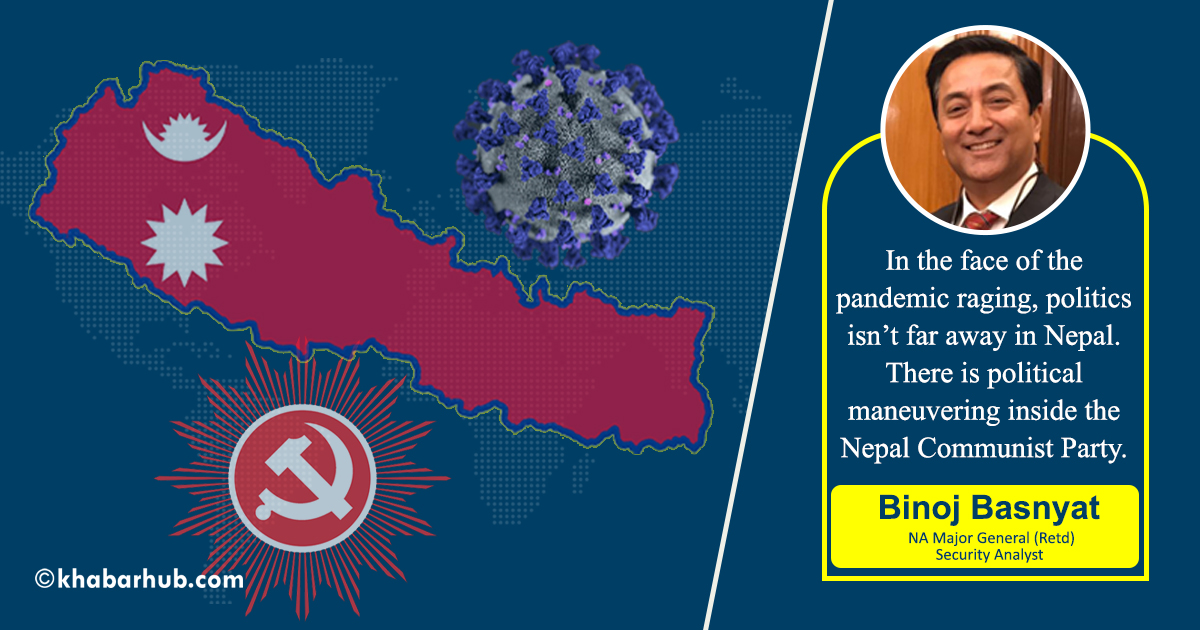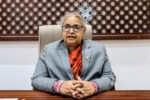Nepal and other South Asian nations mainly India are entering into the seventh week of lockdown with cautions and attempting to find impacts that COVID-19 will bring about.
The exceptional announcement has been able to noticeably slow the advancement of the pandemic across the country with just less than 60 with more than fifty percent in Province-1.
Nevertheless, Nepal has comparatively less diagnosed little more than fifty thousand, handled by suspicion for testing, inadequate testing and technological complication of testing leading to untrue negatives that continue to be an actual possibility.
These are predicaments that necessitate to be dealt with as soon as possible as the mortality has been significantly controlled.
The response and political decisions will bring about multifold challenges. Nepal is looking forward to finding a way forward and loosen the lockdown without reoccurrence of the Coronavirus.
There is active political maneuvering which peaked last week and is now lukewarm inside the ruling Nepal Communist Party and at the same time the other political parties are attempting to form an alliance.
With governments around the world struggling to cope with the pandemic, militias, terrorists, politics and other criminal groups New Zealand, Germany, Spain, Italy, France, Hong Kong, Israel, UAE, and even the US with uncontrolled cases are easing up on restrictions and lockdowns even as cases top 3 million.
At the same time, Singapore and Thailand are extending restrictions, with very much dissimilar count of cases.
In the face of the pandemic raging, politics isn’t far away in Nepal. Two issues are in motion in parallel.
There is active political maneuvering which peaked last week and is now lukewarm inside the ruling Nepal Communist Party and at the same time the other political parties are attempting to form an alliance.
Second, the government’s decision and the impact that COVID-19 will leverage in the days or weeks to come.
There are sufficient indications that terrorist groups, criminals’ activities, smugglers, and intent for corruption take a crisis and now lockdown to their advantage and exploit the state of affairs. But at the same time, it provides an adequate moment in time and occasion for the political will to thrive and come across the response to socio-economy, socio-political and security challenges.
When the global and the region are talking about togetherness, the Nepalese political parties are fragmented for consolidating political power and political gains.
These surrounding is an example and suggest on how collective human behavior seems to be a causal factor to the continuous opening of new viruses.
There may also be a tendency to underestimate recourses available to us triggering shot in focus. This can be referred to as a characteristic of behavioral phenomena known as planning fallacy.
It is estimated that over a million viruses found in wildlife are slowing interacting with humans due to an uncontrolled human-natural world. Demand for mass production of animals for consumption, and deforestation thinning the human-wildlife distance, for example, will continue to give way to zoonosis (a virus jump from a non-human animal to a human).
Additionally, human behavior is such that priorities swiftly fade to newer issues over a period of time. This happens when we overestimate our ability to deal with certain scenarios, like governance of public health in case of COVID-19, and gradually focus on other issues without a proper extraction plan in the next weeks, months, and years.
Even investment in pre-pandemic stages which seem to be on top of the list for decision-makers will gradually receive less attention in the future dues to this overestimation of capability.
There may also be a tendency to underestimate recourses available to us triggering shot in focus. This can be referred to as a characteristic of behavioral phenomena known as planning fallacy.
The lockdown has hauled out a dreadful social and economic cost. The wide-ranging casual workforce and large scale migrated workforce has been without livelihood almost two months now colliding the socio-economy.
The COVID-19 has impacted on the economy to almost all the nations that Nepalese have migrated to. Slow down of remittances and return of a large number of workers will add to the Diaspora.
The increase in lockdowns will increase financial loss and at the same time opening up lockdown will activate to lower financial hammering but the main three contests are the unreliability of the eradication of virus, immunity and reoccurrence.
Nepal cannot prolong with the model of a complete lockdown to a great extent as the socio-economic outlay is exorbitant.
Subsequently broadening the lockdown will holdup reappearance, it won’t evade it.
The World Health Organization (WHO) has altered Nepal from high risk to risk level country, which gives optimism on the functioning but with the additional contest. India is among the 30 high-risk countries with open borders and free movement though the movement is controlled now.
The Nepali demography expresses that more than seven million people are outside the country on various engagements.
Some 49 Nepalese living in 24 different countries have lost their lives due to Coronavirus as of today. As per the Non-Resident Nepalese Association, more than two thousand Nepalese have tested positive.
The COVID-19 has impacted on the economy to almost all the nations that Nepalese have migrated to. Slow down of remittances and return of a large number of workers will add to the Diaspora.
The worst scenario is a prolonged lockdown in India which will impact globally but Nepal with severity and most likely push the country’s economy and resources into pessimism.
COVID-19 to date across the globe is increasing Nepalese need medical attention with an “Exit Strategy” to ease lockdown but the fragile national health systems restrict with shortages in healthy medical professionals able to provide lifesaving care with limited testing and treatment option.
Disengagement and Engagement Strategy
The strategy and the rules of dealing with the health crisis have got to modify. Nepal needs a new strategic stance, a new definition, and a strategy of conquest as we enter the third phase.
The procurement of medicines and supplies in health systems is typically one of the most vulnerable areas for corruption. Identifying these corruption risks before they happen can help strengthen response and get health care to those who need it most.
The threat of the virus is here to stay until vaccines are ready. It is imperative to arrange an adaptation of COVID-19 from a volatile endemic into a drawn-out endemic that can be dealt with by upgraded public health systems.
The virus is breaching into the community but is still localized. To arrive at this triumph Nepal must draw and launch an “Exit Strategy” with two distinct policies one, to disengage within the country and two, engage with the population returning home.
When the state is disengaging from lockdowns it could be a decentralized mechanism with districts or local political entities.
While encouraging the grass-root, determination by the federal government will have to identify, test, and isolate to prepare and protect from reoccurrence.
The need to identify hot zones and prioritize them by the risk of fatality and spread by proclaiming High, Medium, and Low or Free/No risk districts or Municipality and even wards or Village Development Committees (political structure), assuring modalities, responsibilities and accountability. It can be settled from the first to the third phase.
This will promote and lend a hand to local political bodies in the long term for answering and becoming accountable to emergencies with adequate equipment, venues and professionals. People can’t be victims by undeveloped political decisions.
The objective of the engagement approach for the returnees within the country or from abroad must be entirety isolation via neighborhood watch and fortifying of the locality, 100 percent home-based isolation, 100 percent testing, and protected sterile entry and exists in line with the contagion management principles.
Watching and coordination with India and their strategy to ease lockdowns are paramount for modalities that Nepal adopts.
Five lessons that need persuasion is that pandemic is more than global health desolation, no one nation can fight this virus alone, lack of preparedness and capabilities of public health, functions of WHO and South Asian Association for Regional Cooperation (SAARC) and finally risks of pandemic becoming a human rights crisis.
Nepal relies on remittance and tourism, the impact on the economy might lose up to US$ 322 million according to the Asian Development Bank.
The most at risk are small and medium scale enterprises and more than 400 startups. Building ideas on post-pandemic recovery in the themes of community, education, business, and public health is viable and at the same time, Nepal Rastra Bank has alleviated a two percent reduction on interests.
The environmental damage control mechanism must be introduced by going back a century and implement green transformation.
The nation must be really alert on terror groups, illegal activities, as well as corruption as these non-state and state actors, are viable to promote these acts using the pandemic crisis as an opportunity when the government machinery is busy with the actual threat and un-wanted politics maneuvering.
The global crisis requires global safety assurances with a regional response to the crisis so the Ministry of Foreign Affair should enter SAARC charters.
Working together and collectively with India to stop nonessential travels, trade, and strictness in people’s movement and secure basic essentials supply is needed more than ever.
Activating SAARC Disaster Management Center and form a joint task force to coordinate defense, law and order matters with India and if need be China.
Authoritative governments dealing with the crisis looks convincing in this COVID-19 pandemic but must be temporary with a return to democratic norms and values. In Hungary, a law enacted on March 30th which meant that Victor Orban, who has been Prime Minister from 2010 can rule by decree bypassing the parliament until the Coronavirus crisis is over.
He takes near-dictatorial powers. With a constitutional majority, he can turn this into an invincible stronghold of power.
The nation must be really alert on terror groups, illegal activities, as well as corruption as these non-state and state actors, are viable to promote these acts using the pandemic crisis as an opportunity when the government machinery is busy with the actual threat and un-wanted politics maneuvering.
Lessons learned from previous global health emergencies, like the Ebola virus and swine flu; unfortunately, corruption risks often thrive during times of crisis, particularly when institutions and oversight are weak and public trust is low.
The procurement of medicines and supplies in health systems is typically one of the most vulnerable areas for corruption. Identifying these corruption risks before they happen can help strengthen response and get health care to those who need it most.
According to the UN Office on Drugs and Crime, approximately 10–25 percent of all money spent on procurement globally is lost to corruption. In the European Union, 28 percent of health corruption cases are related specifically to the procurement of medical equipment.
To conclude five principles are indispensable, firstly by building trust and unity within the country and the global front, building a narrative of optimism, opposing forces that divide, providing all and sundry a role by fostering the grass-root and lastly adopting “Exit Strategy” with disengagement and engagement course of action justly by defying new discrimination, corruption and dissuade exploiters and free riders.
(Basnyat is a Nepal Army Major General (Retd.) and a Security Analyst)
(Views expressed in this article are the author’s own and do not necessarily reflect Khabarhub’s editorial stance).









Comment